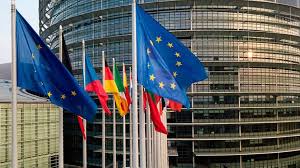The EU Agreed to Transfer Income from Frozen Russian Assets to Ukraine
The Council of the European Union has made a historic decision, opening new opportunities for supporting Ukraine in its struggle against aggression from the Russian Federation. This decision concerns the use of income from frozen assets of the Central Bank of Russia to aid Ukraine. According to this plan, Ukraine will receive up to 3 billion euros by the end of the year, 90% of which will be allocated for military needs. This was announced by Pavlo Frolov, a member of the permanent delegation to the OSCE Parliamentary Assembly.
Key Provisions of the Plan
The EU's decision stipulates that Ukraine will receive the net profit from the frozen Russian assets starting from February 15. According to Euroclear, in the first quarter of this year, about 159 billion euros of frozen assets generated a net profit of 557 million euros. These funds will be used to strengthen Ukraine's defense capabilities and support other critically important needs.
Economic Context
The European Union made this decision as part of the broad sanctions against the Russian Federation imposed after its aggression against Ukraine. Freezing the assets of the Central Bank of Russia has been one of the most significant measures aimed at economically isolating the aggressor. Using the income from these assets to support Ukraine is a logical step that underscores the EU's solidarity with Ukraine.
Allocation of Funds
As Pavlo Frolov noted, the main portion of the received funds will be directed towards military needs. This includes the purchase of weapons, equipment, ammunition, and other materials necessary for Ukraine's effective defense. Additionally, part of the funds will be used for humanitarian aid, rebuilding destroyed infrastructure, and supporting the country's economic stability.
Future Plans
It is expected that all profits from frozen Russian assets in G7 countries will generate about 5 billion euros annually. Ukraine will receive these funds twice a year. G7 ministers plan to discuss this issue at the summit in Italy in June. The importance of this issue is emphasized not only by its economic but also its political significance, as it aims to strengthen international support for Ukraine.You may be interested in the following articles: Analysis, consultation, evaluation. legal analysis of the situation, lawyer's consultation, lawyer's consultation, analysis of documents, legal analysis of the situation, written consultation, verification of documents by a lawyer, lawyers' documents, lawyer's help online, lawyer online, legal opinion, legal opinion of a lawyer, lawyer online.
International Reaction
The EU Council's decision has received widespread response in international circles. G7 member countries actively support the initiative and express their readiness to assist in its implementation. This decision is also positively received by international financial institutions, which see this step as an important mechanism for supporting Ukraine in wartime conditions.
Conclusion
The EU Council's decision to transfer income from frozen Russian assets to Ukraine is an important step towards strengthening international solidarity with Ukraine and supporting its fight against aggression. This step not only provides financial support but also underscores the political will of the EU and G7 countries to stand by Ukraine in this critical moment. The further implementation of this plan will depend on the effective use of the received funds and the support of the international community.
Successful implementation of this decision can serve as an example for other countries and organizations that seek to support Ukraine and weaken the economic influence of the aggressor. At the same time, this decision reminds us of the need for further consolidation of international efforts to achieve peace and stability in the region.

































